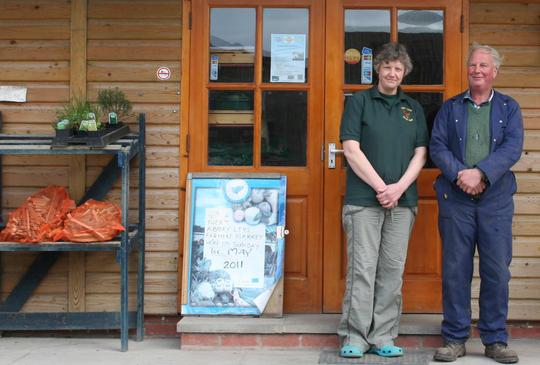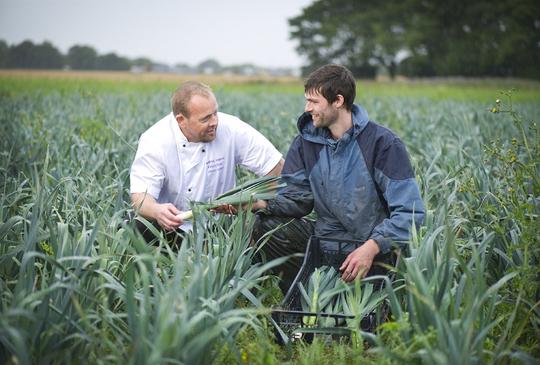
Creating a sustainable food chain in Greater Manchester - from the ground up!
The model for Manchester Veg People went to crowdsource funding and smashed its £16,000 target in 2013, pioneering fair prices for growers and demand-led, top quality ingredients with a local label for buyers.
Sustainable food chains help to look after the land and protect the interests of small-scale growers, enabling them to speak for themselves. However, it is apparent that the innumerable benefits are not getting to the ears of those whose buy-in - ideologically and financially - something that is required in order to propel these models.
“The aim is to grow the demand in tandem with growing the supply," Rob Alderson, one of the Veg People and a grower himself explains. "We get the whole food chain to work together. It is a multi-stakeholder operation, a circular link between growers, workers and buyers. It gives both growers and buyers the ability to crop-plan very accurately. We can do that on a community wide scale.
A top chef at one of the city’s finest restaurants can ask if a grower can do something for them or a big caterer might say ‘we need a certain size of beetroot’ and one of our growers can respond. It provides a massive increase in security for growers. The feedback is that the quality is the best around and, for buyers, it is great marketing to say they are using local produce.
However, like farming, it’s a very established industry with some big players and in order to compete, my sense is that it needs a lot of money. We currently have a small fridge in Smithfield market and three people!”

Veg People has benefited from EU funding and the help of The Kindling Trust to secure support and cash. It has seven growers and 40-45 regular buyers, from The University of Manchester to small-scale local eateries. To stay competitive though, Veg People must invest in order to grow.
“One of the big demands of caterers is for washed and prepared veg," Rob continues. "Even more so, chopped and washed veg. The more control we can have over washing, the better quality the veg. But to do that yourself, you need equipment.
The money involved in buying that is enormous but it is something we’re looking to cost up. There is a certain leap of faith that needs to happen. It's a good model, it just needs to get more money in, to take it to where it could be. To make Manchester a more sustainable food city, policy makers and decision makers in Manchester could make a big difference with procurement policies. You can have a healthy diet and reduce climate change emissions dramatically without changing costs much.”
There is also the issue of the value placed on the quality of produce in the wider consumer climate. When comparing organic produce against non-organic on the supermarket shelves, apples and apples does not mean like for like. Sustainability champions will argue that if non-organic price tags carried the cost of cleaning up rivers and carbonised land, or of fossil fuels used in creating fertilisers, organic would become the cheaper, more popular, option.

The problems hampering the progress of Veg People are the same as those hampering their growers. Rob is a founding Member Director of Moss Brook Growers, an initiative that came about through the Unicorn Grocery’s decision to buy 21 acres of sustainable farm land near Glazebury, to the south of Leigh. The intention was to rent it to experienced growers, however a skills shortage presented itself when it came to the type of farming Unicorn required.
Rob and his colleague, Stuart Jones, a Director at the Chorlton Grocery, decided to plug the gap. They put their hands up, and with the permission of the rest of the membership, they embarked on their first growing season in 2010.
Moss Brook Growers pay a peppercorn rent to Unicorn, who also take 75% of their sales. They crop-plan together and get detailed sales data, minimising waste to just a tiny percentage of what the land produces. This relationship has been fundamental, as well as the tie-in with Veg People, who take 12.5%, with a firther 12.5% going to Organic North wholesalers.
Rob and Stuart spent in the region of £30,000 on machinery - two tractors, around 30 implements, an outbuilding, electricity and a borehole and have also recruited a third grower, Carl Turton, on site as a Land Army volunteer. Working weeks are dictated both by the weather and by growing schedules. In summer, someone is on site everyday, in winter, just two or three days a week. “Its a hell of a juggling act as we’re running every aspect of the business,” says Rob.
However, Moss Brook has reached a bit of a crossroads. As well intentioned as it may be and with the enthusiasm of those with like minds, it is simply not a viable business. It has made a loss every year and will take the next season off while they figure out how to make the dream of sustainable, organic farming, financially fruitful. This not only effects them, but also the supply going through Veg People.
Soil issues and scale seem to be two of the biggest problems. “Twenty acres may sound or look big but it is actually very, very small," Rob explains. "There’s no two ways about it. Whatever level you’re at, you’re competing with everyone growing veg in the country. The prices people see in the supermarket, whether organic or not inform people’s opinions. Some of the most experienced organic growers in the country say to us that it takes ten years and even then it only takes two tremendously bad seasons like 2012 to set you right back.”
In addition, growers such as Moss Brook are working on fluctuations in customer demand of 50-70%, compared to the usual 5-10%.
To be profitable, broccoli, one of the better crops for example, needs to be produced at around £1.90 per kg. Last year, it was produced at £2.90 per kg. Costs of production are clearly not where they need to be. To cut them, they need new machinery and new investment.
“There are plenty of proven viable organic veg buying-businesses on a smaller scale, such as market garden and polytunnel growing where equipment is a fraction of the cost," Rob says. “The type of market we’re going for is in itself a bit tricky because we’re trying to be wholesale growers. It’s very different selling in a box scheme market or farm shop where you have the ability to be less competitive. Historically, the most resilient farms of any type are family farms. They have spent decades gradually investing and keeping their farms competitive.”
For both Veg People and Moss Brook, the pressure is on to find and implement an appropriate model in a very short space of time.
Contributor Profile
Deborah is a freelance journalist with more than ten years experience of news, comment, analysis and interviews with some of the country, and the region's, highest profile figures. Her work covers a broad spectrum of writing and communications for media, public and private sectors.
@deblinton



